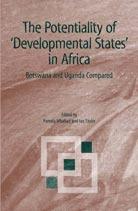The Potentiality of ‘Developmental States’ in Africa: Botswana and Uganda Compared
Keywords:
Africa, Developmental States, Uganda, BotswanaSynopsis
Dakar, CODESRIA, 2005, 188 p., ISBN: 2-86978-164-4
The Potentiality of ‘Developmental States’ in Africa investigates the potential role of the state in Africa in promoting development in this era of globalisation. Using Botswana and Uganda as case studies, the volume argues that it is not the amount of state involvement in the economy that matters, but the quality. This set of original studies compares and contrasts issues that distinguish the two countries’ development record and style of activity of the state in promoting development.
Written by a collection of researchers drawn mainly from Botswana and Uganda, this book argues that there are some elements of the developmental state model which can be seen in both countries. These elements have arguably contributed to some of the relative successes in the two states. Contextualising the case studies within the history and political economy of the respective countries, the book is a valuable addition to the on-going debate on the role, nature and character of states in Africa. A must read for development studies students, researchers, politicians and development practitioners.
Chapters
-
Botswana and Uganda as Developmental States(?)
-
Success or Failure of Developmental States in AfricaExploration of the Development Experiences in a Global Context
-
Uganda as an African ‘Democratic Developmental State’? HIPC Governance at the Turn of the 21st Century
-
The Developmental State in AfricaThe Case of Botswana
-
Uganda’s Institutional Framework for Development Since ColonialismChallenges of a Developmental State
-
The Institutional Framework of the Developmental State in Botswana
-
Decentralisation and African Developmental StatesExperiences from Uganda and Botswana
-
Gender and Developmental StatesBotswana and Uganda
-
The Privatisation Experience in UgandaProspects and Challenges in its Implementation
-
The Developmental State and Manufacturing in Botswana and Uganda
-
Conclusion
-
References
Downloads
References
Abraham, K., 1995, The Missing Millions: Why and How Africa is Underdeveloped, Trenton, New Jersey: Africa World Press.
Abrahamsen, R., 2001, Disciplining Democracy: Development Discourse and Good Governance in Africa London: Zed Books.
Acemoglu, D., Johnson, S. and Robinson, J., 2001, ‘How Botswana Did It: Comparative Development in Sub-Saharan Africa’, unpublished paper.
ACFODE, 1988, Women Breaking Through, Kampala: Action for Development. Adhikari, R. and Kamalesh, A., 2000, Privatisation: Expectation and Reality, Kathmandu:Pro-Public.
Adler, G. and Steinberg, J., eds., 2000, From Comrades to Citizens: The South African Civics Movement and the Transition to Democracy, London: Macmillan for Albert Einstein Institution.
African Development Bank, 1991, African Development Report 1991, African Development Bank.
Africa Development Bank, 2003, Selected Statistics on African Countries, African Development Bank: Tunis.
AGOA Report, 2002, 2002 Comprehensive Report on U.S Trade and Investment Policy Towards Sub-Saharan Africa and Implementation of the African Growth and Opportunity Act, The Second of the Eight Annual Reports, May 2002, www.agoa.gov/About AGOA/ annual2.pdf
Ajulu, R., 2001, ‘Uganda’s Flawed Presidential Election Bodes Ill for the Future’,Global Dialogue 6 (2), July: 20-22.
Akampumuza J., 1992, The Conditions of Labour in the Brickmaking Industry in Kabale,Makerere University LL.M Dissertation.
Akampumuza J., 1996, The Return of Asians In Uganda, an Analysis of its Legal and Political Aspects, Makerere University LL.M Dissertation, unpublished.
Amsden, A., 1994, ‘Why Isn’t the Whole World Experimenting with the East Asian Model to Develop? Review of The East Asian Miracle’, World Development, 22 (4).
Amin, S., 1996, 'On the Origins of Economic Catastrophe in Africa' in Chew, S.C. and Denemark, R.A. The Underdevelopment of Development. California: Sage Publications Inc. pp. 200-216.
Keck, M. and Sikkink, K., 1998, Activists Beyond Borders: Transnational Advocacy Networks in International Politics, Ithaca: Cornell University Press.
Kevane, M. and Englebert, P., 1999, ‘A Developmental State Without Growth: Explaining the Paradox of Burkina Faso in Comparative Perspective’ in K. Wohlmuth, H. Bass and F. Messner (eds) African Development Perspectives Yearbook 1997/98, Munster: Lit Verlag.
Khadiagala, G. and Lyons, T., eds., 2001, African Foreign Policies: Power and Process, Boulder: Lynne Rienner.
Khadiagala, L., 2001, ‘The Failure of Popular Justice in Uganda: Local Councils and Women’s Property Rights’, Development and Change 32 (1).
Khama, S., 1980, ‘Addressing the Nation on the Occasion of the Tenth Anniversary of Independence—30 September 1976’, in G. Carter and P. Morgan (eds) From the Frontline: Speeches of Sir Seretse Khama, London: Rex Collings.
Kindleberger, C.P., 1958, Economic Development (2nd ed.), Tokyo: McGraw Hill Kogakusha Ltd.
Klein, N., 2000, No Logo: Taking Aim at the Brand Bullies London: Flamingo.
Knight, B., Chigudu, H. and Tandon, R., 2002, Reviving Democracy: Citizens at the Heart of Governance, London: Earthscan.
Koelble, T., 1999, The Global Economy and Democracy in South Africa, New Brunswick, New Jersey: Rutgers University Press.
Kwesiga, J., 2000, Women’s Access to Higher Education in Africa: Uganda’s Experience,Kampala: Fountain Publishers.
Langseth, P., ed., 1995, Uganda: Landmarks in Rebuilding a Nation Kampala: Fountain Publishers.
Leftwich, A., 1995, ‘Bringing Politics Back In: Towards a Model of the Developmental State’, The Journal of Developmental Studies, Vol. 31, No.3.
Leftwich, A., ed., 1996, Democracy and Development ,Cambridge: Polity Press. Leftwich, A., 1996, ‘On the Primacy of Politics in Development’ in A. Leftwich (ed.)Democracy and Development, Cambridge: Polity Press
Leftwich, A, 1996, ‘Two Cheers for Democracy? Democracy and the Developmental State’ in A. Leftwich (ed) Democracy and Development, Cambridge: Polity Press Leftwich, A., 2000, States of Development: On the Primacy of Politics in Development,
Cambridge: Polity Press.
Leith, C., 2000, ‘Why Botswana Prospered’, unpublished paper, November. Lekorwe, M, 1998, ‘Local Government and District Planning’ in W. Edge and M.
Lekorwe (eds) Botswana: Politics and Society, Pretoria: Van Schaik.
Lengseth, P., 1996, ‘Civil Service Reform: A General Overview’, in F. Lubanga and S. Villaden (eds) Democratic Decentralisation in Uganda: A New Approach to Local Governance, Kampala: Fountain Publishers.
Lewis, D. and Wallace, T., eds., 2000, New Roles and Relevance: Development NGOs and the Challenge of Change, West Hartford: Kumarian.






